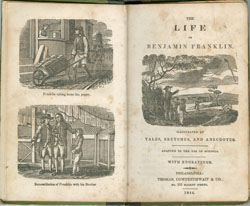The Life Of Benjamin Franklin
|
| updated |
Copy Link Code
|
 Beginning in 1706 in Boston, the life of Benjamin Franklin would be filled with daring challenges, innovative solutions, astounding discoveries and diplomatic victories. Franklin was the greatest American polymath of the 18th century if not all time; his vocations included printer, publisher, writer, scientist, inventor, postmaster and statesman. He found business success through the printed word with both a newspaper, The Pennsylvania Gazette, as well as his annual publication, "Poor Richard's Almanack". In the latter, Franklin wrote under the nom de plume Richard Saunders and included poetry, essays and satire alongside the usual almanac topics of meteorology, astronomy and astrology. The Masonic Lodge of Philadelphia made him Grand Master in 1734 and many of Franklin's portraits include hidden symbols of the Freemasons. His connections and demonstrated expertise afforded Franklin the position of Postmaster for Philadelphia and after years of success, the British Parliament appointed him joint Deputy Postmaster-General of North America in 1753. Franklin's invention of the odometer proved useful in establishing the quickest route between towns and cities. It was in this same stage of life that Franklin would become famous for his scientific boldness.
Beginning in 1706 in Boston, the life of Benjamin Franklin would be filled with daring challenges, innovative solutions, astounding discoveries and diplomatic victories. Franklin was the greatest American polymath of the 18th century if not all time; his vocations included printer, publisher, writer, scientist, inventor, postmaster and statesman. He found business success through the printed word with both a newspaper, The Pennsylvania Gazette, as well as his annual publication, "Poor Richard's Almanack". In the latter, Franklin wrote under the nom de plume Richard Saunders and included poetry, essays and satire alongside the usual almanac topics of meteorology, astronomy and astrology. The Masonic Lodge of Philadelphia made him Grand Master in 1734 and many of Franklin's portraits include hidden symbols of the Freemasons. His connections and demonstrated expertise afforded Franklin the position of Postmaster for Philadelphia and after years of success, the British Parliament appointed him joint Deputy Postmaster-General of North America in 1753. Franklin's invention of the odometer proved useful in establishing the quickest route between towns and cities. It was in this same stage of life that Franklin would become famous for his scientific boldness.
In 1750, Benjamin Franklin published his plans for an experiment to prove his hypothesis that lightning was indeed electric. In May of 1752, a French scientist and friend of Franklin's, Thomas-Francois Dalibard, successfully drew sparks from stormy clouds using a 40 foot tall iron rod. It was a month later, however, that Franklin would complete a much more daring method of drawing sparks from the clouds with a copper key tied to a kite. This experiment would make Franklin famous throughout the European and colonial world, even earning him an invitation to meet the King of France and explain his vision of a future with ubiquitous use of electricity. Benjamin Franklin's life would never slow down as his fame and intelligence provided him greater opportunity to make an impact on society and the world at large.
Franklin's diplomatic career would begin in 1757 when he went to England as a representative of Pennsylvania and ended up working for most of the other colonies as he proved adept at Parliamentary politics and respected by its Members. It was Franklin's speech before Parliament that would convince them to repeal the infamous Stamp Act of 1765 which had enflamed independent sentiments in the American colonies. In 1774, Ben Franklin's life would take a drastic turn as he lost his position and respectability in Parliament through a scandal that outed him as a rebel. Franklin had seized letters from the Governor of Massachusetts asking for more British troops to squash the rebellious population of Boston and leaked the information to the Sons of Liberty. After three innocent men were accused of the leak, Franklin admitted his role and was condemned before Parliament. He returned to Philadelphia and soon joined the Second Continental Congress in the move towards Revolution. Franklin was part of the Committee of Five that advised Jefferson on the writing of the Declaration of Independence. He was sent to France during the war and was successful in securing their support, which proved crucial for American victory. In 1783, Franklin was the elder statesman at the negotiations for peace which culminated in the Treaty of Paris. The life of Benjamin Franklin came to an end in 1790, relatively a very long life by contemporary standards.
